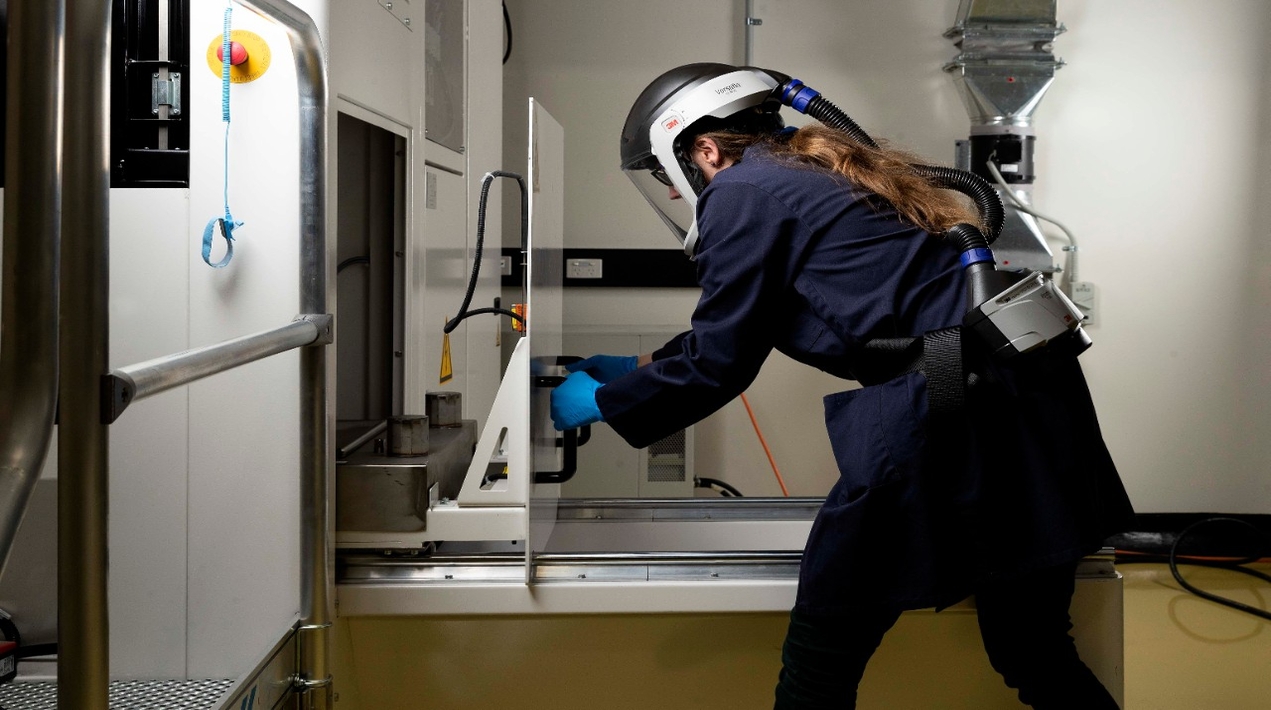
A $25 million facility was launched to drive innovation and foster industrial output in the heart of Sydney’s Tech Central. The facility is a foundational node for complementary facilities that support the NSW Government’s projects at Western Sydney Aerotropolis and Western Sydney parklands.
Located in the Engineering precinct of the University of Sydney’s Darlington campus, the Sydney Manufacturing Hub is a new manufacturing-focused research facility that will work alongside industry to deliver cutting-edge R&D in additive manufacturing and materials processing. It is geared to enable concept-to-production demonstration capabilities, including advanced pre- and post-processing of materials for faculty, students, small and medium-sized companies, and, if needed, larger companies to experience and leverage metal 3D printing (also known as additive manufacturing) and advanced manufacturing – often for the first time.
The Hub provides capabilities for design, topological optimisation, the 3-D printing of metals, ceramics and polymers, as well as post-processing heat treatment, advanced characterisation and more, paving the way for new technology in industries like aerospace, autonomous vehicles, biomedical, defence, maritime and robotics.
University of Sydney Vice-Chancellor the University has continued to demonstrate its capability as an R&D leader in the region by working closely with both the public and private sector. The Sydney Manufacturing Hub is a key demonstrator for what’s ultimately possible when government, industry and higher education work together on high-impact technologies. This is evidenced not only through the establishment of this new research facility but also via collaborative projects in Greater Sydney, particularly the Western Sydney Parklands and Aerotropolis.
Speaking at the launch, the Minister for Jobs, Investment, Tourism and Western Sydney and Minister for Trade and Industry stated that the concept of modern and additive manufacturing, rather than deductive manufacturing, is completely changing the opportunities that are available to Australians.
The Director of the University of Sydney’s Core Research Facilities said the Sydney Manufacturing Hub would drive the state’s ‘Industry 5.0’ revolution. He noted that advanced manufacturing is making the previously impossible possible. Key industries will benefit from these technologies through the reduction of material waste, simplified supply chains, and an independent capacity to create materials, components and even whole machines – all of which weren’t possible using traditional manufacturing.
Using these technologies, Australian-designed and built space rocket engines, hypersonic vehicles, satellites, eco-active building and construction could be seen as well as the fast-tracking of the electrification revolution in propulsion. It will even be transformative for areas like health – the team have recently leveraged additive manufacturing in the production of custom orthopaedic implants to help with patient-specific needs.
The research facility places Sydney at the centre of new skills-based development and puts the gears in motion for the state’s advanced “Industry 5.0” output. The facility will provide specialised consulting, fabrication activation and training to its industrial partners, providing both guided and autonomous access to the facilities for testing, research and fabrication.
One such partner is a world leader and pioneer in additive manufacturing technology which entered into a strategic five-year agreement with the University in 2020 to advance Australia’s manufacturing capability. The University of Sydney and the company are collaborating on R&D topics around materials, with experimental work performed at the new facility.
Accommodating state-of-the-art metal printing technologies from the firm, the Hub will serve as a technology demonstration centre for the company across Australia and New Zealand and host workshops, training and collaboration sessions for the industry.
Additive manufacturing overview
- Additive manufacturing is a transformative approach to industrial production that enables the creation of lighter, stronger parts and systems.
- It is yet another technological advancement made possible by the transition from analogue to digital processes. In recent decades, communications, imaging, architecture, and engineering have all undergone their own digital revolutions. Now, additive manufacturing can bring digital flexibility and efficiency to manufacturing operations.
- Additive manufacturing uses data computer-aided-design (CAD) software or 3D object scanners to direct hardware to deposit material, layer upon layer, in precise geometric shapes, to create an object. The technology can be used to build advanced metallic structures such as alloys and aircraft engines. By contrast, when you create an object by traditional means, it is often necessary to remove material through milling, machining, carving, shaping or other means.
- Although the terms ‘3D printing’ and ‘rapid prototyping’ are often used to describe additive manufacturing these processes are a subset of additive manufacturing.
- In the right applications, additive manufacturing delivers a trifecta of improved performance, complex geometries and simplified fabrication.
- Advanced manufacturing accounts for half of Australia’s manufacturing output and is one of the fastest-growing export sectors. The nation’s manufacturing output is estimated to reach $131 billion by 2026, with advanced manufacturing potentially growing the domestic sector by approximately $30 billion over the next five years.
















